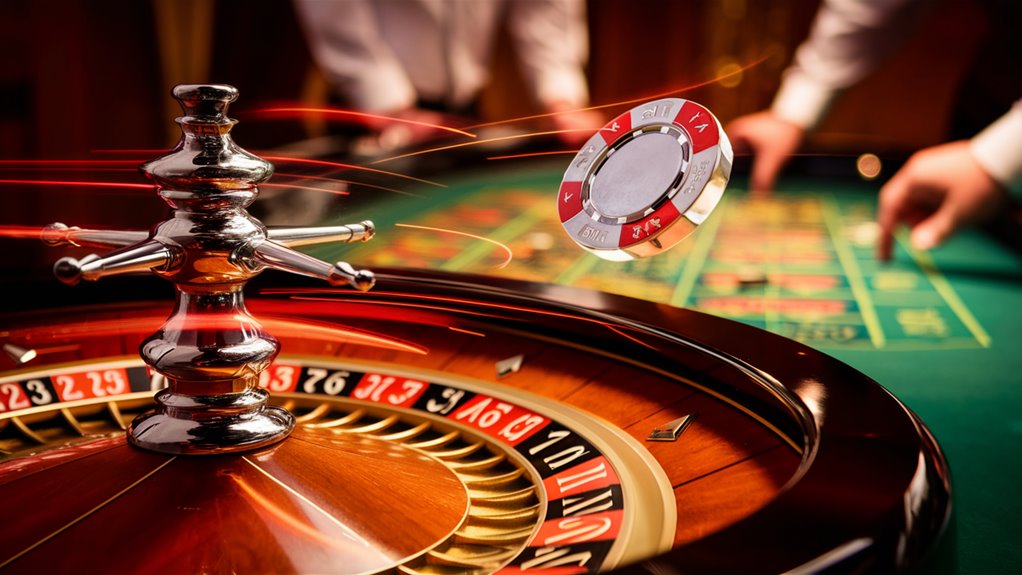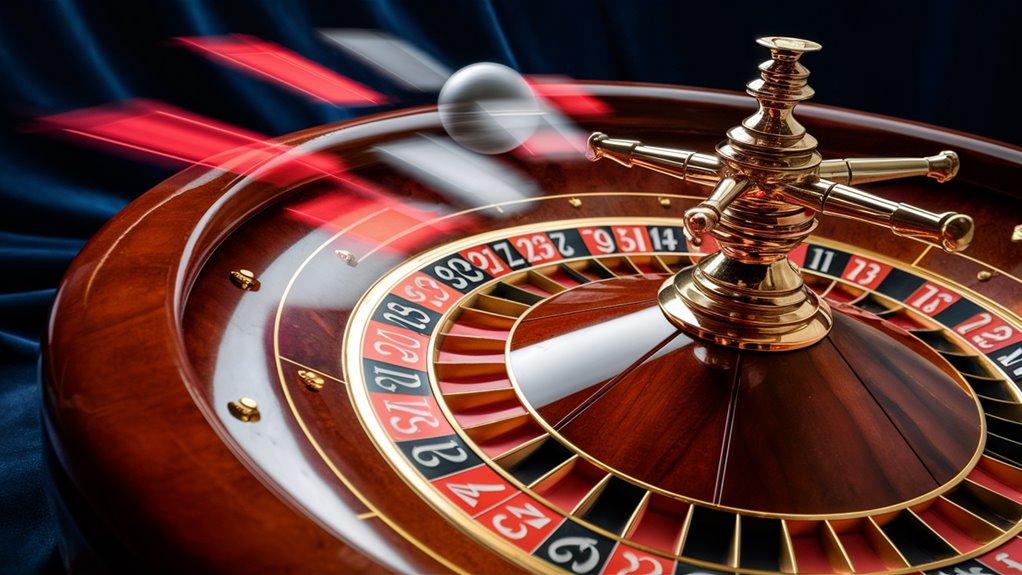
Roll and Win: Math Rules the Game

How Casinos Use Numbers and Stats
The smart math in casino games is based on exact odds that set the win rates. Random Number Generators (RNGs) do many high-level counts each second, making sure every game result stands on its own on all play forms. 토토사이트
Odds for Every Game
Roulette Numbers
European roulette has a 48.6% chance on simple bets like red or black. This shows how each wheel spin has math built in to give the house a slight lead. A lone zero gives the house a 2.7% upper hand due to set number play.
Blackjack Odds
In blackjack, you get a 30.8% shot to draw cards worth ten. The game’s chance changes with deck make-up and dealer rules. Smart play can drop the house edge just under 1% by using stats to make the best moves.
Slots Math
Today’s slot machines work on Return to Player (RTP) rates from 85-98%, set by hard math over lots of spins. These rates tell what you might expect to win back over time.
The Edge of the House
Casinos make money with well-plotted house edges ranging from 0.5% to 15%, figured out by:
- Models of number spread
- Real odds against pay odds
- Game-by-game chance plans
Smart Bet Tactics
The Kelly Criterion guides on how much to bet, using:
- Win chances
- Possible pay-outs
- How much money you have
Knowing these deep number plans lets players make choices based on data, seeing the real stats of casino play.
Basics of Odds and Edges
Know Your Casino Odds and House Edge
Basic Betting Math
When you bet, two key number ideas set your possible end: chance and house edge.
These core parts together fix likely wins and long game outcomes in any casino play.
Simple Chance
Chance is the number likelihood of a win, shown as a small part between 0 and 1, or as a percent.
For instance, flipping a coin gives a 0.5 chance (50%) to guess right.
House Edge Made Simple
The house edge is the casino’s set math lead in all games.
This key rate is found by the gap between real odds and the odds that pay. Look at these cases:
- Roulette: Betting on red has 18/38 chances (47.37%)
- Pay odds are even (1:1), hinting 50% chance
- The 2.63% gap is the house edge
Expected Worth and Long Plays
Grasping expected value is key for wise betting. For example:
- A $100 bet on red in roulette means you might lose $2.63
- That’s from your bet ($100) times the house edge (2.63%)
- More bets mean less swing from the expected
- Real results get closer to math guesses over many bets
How RNGs Work
Gambling and Random Numbers
RNG: Fair Play in Digital Games
Random Number Generators (RNGs) are key to modern online betting, giving the needed randomness for fair play on all digital gaming forms.
RNG in Action
Complex number tricks run today’s RNGs, using in-depth math to make numbers we can’t predict.
These systems never stop, creating thousands of counts each second, no matter what players do. The result picking happens right when a player bets or hits a button.
Being Independent
A big part of RNG tech is how it stands alone in making results.
This full chance comes from its no memory act – each new result doesn’t know the ones before it.
The main work mixes seed numbers with big number steps to make random, proven counts.
Rules and Checks
In watched betting zones, rules say RNGs must pass strict tests. These include:
- Chi-square trials
- Runs tests
- Checks on how numbers link
These full checks make sure the made numbers match what theory says, proving digital games are as random as old-style casino games like dice.
Checking the Math
The math checks on RNG systems mean tough test jobs that make sure:
- How numbers spread
- If sequences are random
- If outputs are even
- Number randomness
These math proofs show that modern RNG games really give random results, much like classic casino games.
Math in Top Games
Get the Odds on Casino Games

Math That Runs Popular Games
The base of casino games is built on sold math setting the player odds and house edges.
Here, we look deep into main games:
Blackjack Odds
Blackjack focuses on a vital 30.8% chance to pull a card worth ten, as 16 out of 52 cards hold this value.
The house edge goes from 0.5% to 1.5%, changing by table rules and how well you play your hand.
Roulette Odds
The European roulette wheel puts up clear winning chances:
- Single number bet: 2.7% chance (1/37)
- Red/black bet: 48.6% chance (18/37)
- House edge: 2.7% stays from the zero spot
How Craps Adds Up
Craps bets show set win chances:
- Pass line bet: Win chance at 49.29%
- House edge: 1.41% on normal bets
## Slot Machine Numbers
The latest slot machine chances come from hard number work:
- Return to Player (RTP): From 85% to 98%
- Symbol groups: Set right in the game’s make-up
- Odds plans: Deep math sets win rates
These number structures make sure game play is even while keeping house edges in all casino offers.
Math Splits in Betting
Getting the Math in Gambling
Main Chance Designs in Gaming
Number splits build the math base that sets game wins through tight chance designs.
Most game results lean on three main split ways: normal split, binomial split, and Poisson split, each running different game plans and betting setups.
Game Splits You Should Know
Slot Machine Odds
Slot outcomes use a normal split line, where wins gather around a middle average.
Biggest prizes and huge losses sit at the far ends of the split, making the known curve shape seen in player hopes.
Card Game Numbers
Blackjack odds use a binomial split, where each play is its own try with set win/lose chances. This number setup lets players use known odds to play smart.
How Tournaments Split Prizes
Poker prizes often follow the 80/20 rule, showing an 80/20 split in prize give-out.
The prize share mainly likes those at the top, with about 20% of players getting 80% of all prizes.
Roulette Goes Even
Roulette plays show a even split across all bets over lots of games.
Short game runs might show grouped wins, but long play makes the win chance even across all bets.
Guessing Wins in Betting
Getting these number designs right lets us count on expected worths and win chances.
Games with set split plans give known play lengths and costs. This number base helps make betting plans and how much to risk.
How to Manage Risk
Big Plans for Smart Risk
Setting Up Number Grounds
Number splits lay the ground for any strong risk plan.
Using well-tested risk steps is key to keep long success and save your money.
Keeping Your Money Safe
Watching your money starts with the Kelly Rule, a number rule that says how much to bet based on the edge seen.
The suggested way keeps risk to 1-2% of all your money per bet, saving you from big money drops when times get hard.
Spread Your Bets
Spreading risk over non-linked bets cuts how much you swing up or down. This planned way needs:
- Close watch on each bet
- Record of how you do
- Study of results
- Keeping an eye on links
Control Your Risk
Setting stop losses is key in smart risk handling. Main control steps include:
- Limits per session: 20% of your money
- Limits each day Understanding Payment Methods for Online Gambling
- Targets for when to take wins
- Watching how big your bets are
Make Your Risk Better
Getting better performance means keeping full records while sticking to set risk rules.
This structured plan cuts out choices based on feelings and makes sure you keep within safe risk limits.



